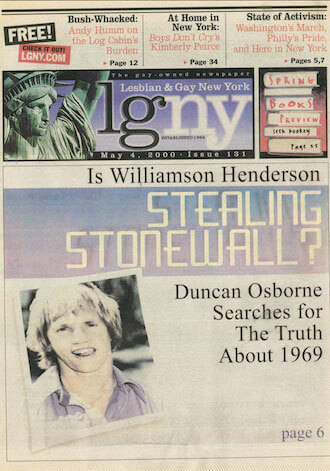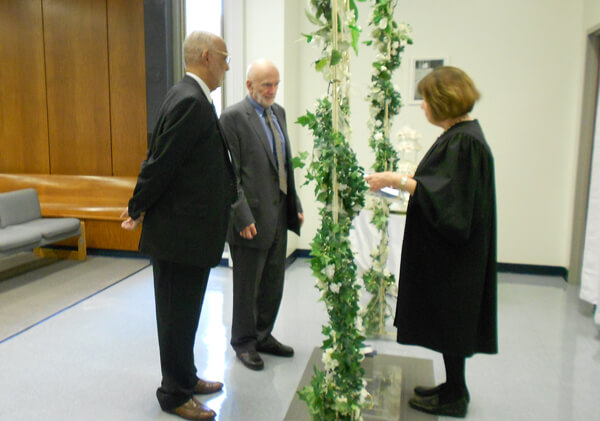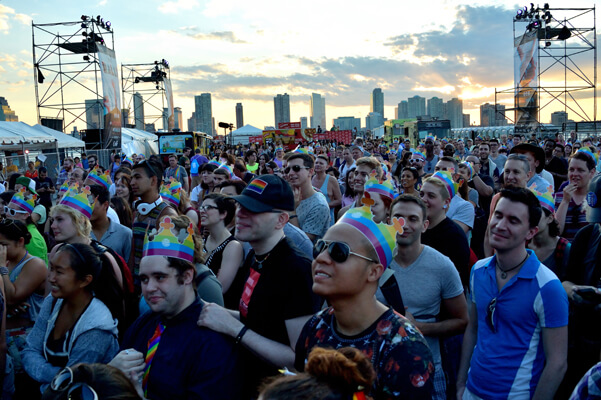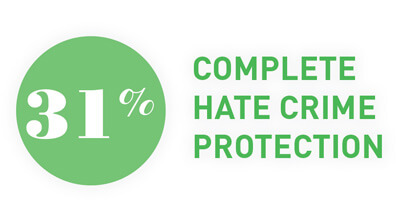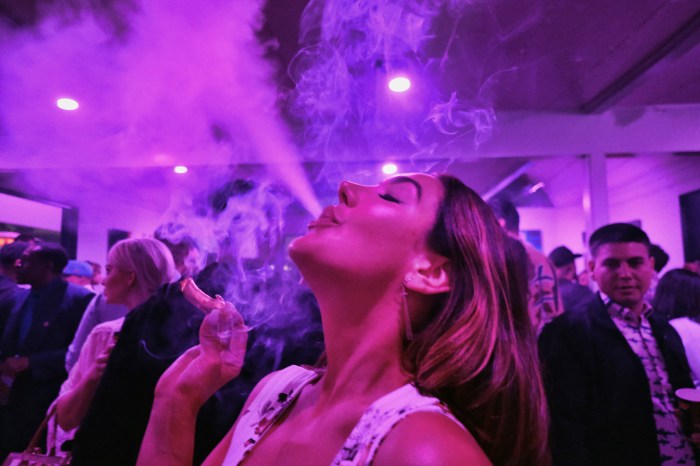ILLUSTRATION: MICHAEL SHIREY
President Barack Obama made gay history in his second inaugural address on January 21.
“Our journey is not complete until our gay brothers and sisters are treated like anyone else under the law,” the president said, marking the first time the LGBT community was ever mentioned in an inaugural address, the most ceremonial moment in American political life.
For queer Americans, Obama’s most stirring words, however, came several moments earlier when he said, “We, the people, declare today that the most evident of truths — that all of us are created equal — is the star that guides us still; just as it guided our forebears through Seneca Falls, and Selma, and Stonewall.”
America’s first black president had placed the gay community’s defining act of political assertiveness into the mainstream of the nation’s fight for equality, alongside the women’s movement and the 1960s African-American civil rights struggle.
In the setting of his inauguration, those words were profound, even revolutionary. But was the formulation itself new for the president? And how were his words — particularly the pairing of Selma, site of a “Bloody Sunday” police attack on civil rights marchers in 1965, and Stonewall — recieved by African-American voters, who are the president’s most loyal supporters? Obama’s posture at the inauguration inevitably raises questions about how his leadership has influenced the conversation about LGBT rights in America — and his ability to move public opinion in his core demographic is a particularly telling measure of that.
Discussions of how the African-American and the LGBT communities get along and view each other have always been fraught — particularly since 2008, when exit polls showed that black voters supported Proposition 8 by a 70-30 percent margin, versus the overall 52-48 edge the initiative achieved. Neither the obvious fact that many voters are members of both communities simultaneously nor follow-up research suggesting that black support for Prop 8 was more in the range of 57-59 percent has eliminated the volatile feelings surrounding this issue.
But even as black attitudes toward gays continue to arouse wide interest, LGBT support for goals sought by African Americans is less frequently discussed. Here, too, the role of queer leaders who are also black is a significant factor, though there is no denying that the LGBT community writ large continues to have a predominately white, and often male, face. True coalition politics, it would seem, remains a lofty aspiration as opposed to an everyday reality.
Gay City News spoke to five African-American gay and lesbian leaders and academics here in New York and nationwide and also looked to the conclusions of one black straight ally — Tulane University political scientist Melissa Harris-Perry, who hosts a weekend news forum on MSNBC — to probe the impact of Obama’s support for LGBT rights among black Americans and how, in turn, his leadership might influence the way the gay rights movement goes forward.
Those half-dozen voices offered different perspectives on how new the president’s words were as well as on the nature of attitudes among African Americans into which his statements enter the mix. All agreed, however, that Obama is moving opinion and that the embrace of mutual interests between the African-American and LGBT communities holds bright political promise.
Harris-Perry, in an article in the Nation magazine, saw Obama’s inaugural words as profoundly important. “When the president name-checked the watershed moments of the women’s rights, civil rights, and LGBT equality movements, he offered a powerful moment of official recognition,” she wrote. She acknowledged that symbolic recognition only means something if it leads to equal treatment, but went on to argue, “Fair recognition and just distribution are not alternatives; they are companions in political struggle.”
Mandy Carter.
Mandy Carter, a longtime lesbian activist who lives in North Carolina, used the word “wonderful” over and over again in assessing the impact of the president’s words. Asked if his statements represented a new articulation of his support for the LGBT community, she responded, “Absolutely.”
Carter is currently coordinating the National Black Justice Coalition’s Bayard Rustin 2013 Commemoration Project, which honors the lead role the late gay black civil rights leader played in organizing the 1963 March on Washington at which Martin Luther King, Jr., delivered his “I Have a Dream” speech. One of five LGBT co-chairs — of diverse racial and ethnic backgrounds — of the president’s 2008 campaign, she believes his inaugural remarks and his endorsement of gay marriage last May represent attitudes he’s long held. “I thought Obama got it about the marriage equality issue from the start and he was not willing to go there yet politically,” she said.
E. Patrick Johnson, a professor of Performance Studies and African American Studies at Northwestern University, echoed that view. “He used the language that he evolved on the issue of gay marriage,” he said. “I don’t think that that’s true. For expediency reasons, he did not disclose his views until it was a time when the country was ready.”
Coming from a multicultural family, Johnson said, the president is instinctively “more accepting of differences” and “gets the connection on civil rights between all sorts of communities.” Prior to his entry into politics, while he was a community organizer in Chicago, Johnson said, Obama “had lots of LGBT people in his circles.” The harsh conservative pushback the president has gotten since becoming president, he said, has shown him how much right-wingers “really despise people who are different,” an experience that likely deepened his empathy for LGBT Americans.
Terrance Knox.
Terrance Knox, a former president of Brooklyn’s Lambda Independent Democrats, an LGBT club, talked about the impact of the president’s words on those he grew up around. For people in Kansas, African-American and otherwise, he said, news coverage of the inaugural address likely provided “an ‘aha’ moment.”
Others were less inclined to see the January 21 comments as a significant departure. Juan Battle teaches sociology, public health, and urban education and runs the Africana Studies Certificate Program at the CUNY Graduate Center in Manhattan. Obama’s words, he said, “were definitely not a new formulation. It was a higher platform and a larger audience at the inauguration. But, he’s made these links between civil rights and gay rights many times before.”
Laura Martin, an activist in Nevada who works for a statewide social justice organization, shares Battle’s view, saying of the inaugural remarks, “I think it’s been what he’s been saying for a while.” Recalling stump speeches during the 2008 primaries where he included “refrains about abolitionists, suffragettes, civil rights, and gay rights,” Martin said, “He’s always been tuned in to how his presidency ties into all the social movements.” The only thing that surprised Martin about Obama’s recent remarks was realizing “this was the first time these kinds of comments were made at an inauguration.”
The fact that Martin doesn’t see his recent formulation as new doesn’t mean she views the president’s posture as any less powerful in shaping attitudes among black Americans. “He’s definitely seen as a leader of the community,” she said. “And my community often takes its cues from people seen as our leaders.”
Others who spoke to Gay City News agreed with that assessment, but also challenged prevailing narratives about an African-American community beset by homophobia. Carter was not alone in pointing to the “scandal” of “white gays [who] blamed blacks for Prop 8.” Political scientists Kenneth Sherrill of CUNY and Patrick J. Egan of NYU used precinct-level data to peg African-American support for the California anti-gay marriage initiative at less than 60 percent as opposed to the 70 percent level found in exit polls.
Polling data from this past November indicated increased support among black voters for marriage equality. An estimated 46 percent of African-American Marylanders supported the narrow victory of gay marriage in that state, and nationwide, 52 percent of black respondents said they are in favor of equal rights for same-sex couples. Under the leadership of Ben Jealous — who has often spoken about his transgender brother who lives in San Francisco — the NAACP endorsed marriage equality last spring just days after the president spoke out.
Carter did not dismiss the reality of homophobia in the black community and among African-American church leaders. At the same time, she pointed to leadership the Reverend Dr. William J. Barber, president of the NAACP chapter of North Carolina, brought to the fight against Amendment One, a ban on gay marriage, in that state last spring. No exit polling was done on the North Carolina marriage vote, and Carter complained that black hostility toward LGBT aspirations nonetheless quickly became part of the narrative that emerged from that losing fight. Northwestern’s Johnson also brought up mobilization by some African-American religious leaders to fight Amendment One in North Carolina, and Carter noted similar efforts in the District of Columbia when its marriage equality law was hotly debated in 2009.
Despite the preponderance of whites in leadership posts in the LGBT community, Johnson and Carter both argued that blacks have played critical roles every step of the way, dating back to Stonewall. The civil rights movement, Carter said, has its LGBT heroes, as well. More than half a century ago, Rustin’s visibility as an out gay man drew resistance among some fellow civil rights activists — and made him an easy target for segregationists like South Carolina Senator Strom Thurmond — but, significantly, Martin Luther King did not walk away from him in the face of such pressure.
In Brooklyn, Knox sees shifting black attitudes toward the LGBT community from a different perspective. Serving on the community board in his Fort Greene/ Clinton Hill neighborhood, he said he has worked on HIV/ AIDS issues for years. “In talking in some places about AIDS,” he recalled, “I used to hear, ‘Oh, that’s not our issue.’ I don’t hear that as much now.” Cultural differences, he indicated, fade in the face of a common health threat.
Professor Juan Battle.
Martin and Battle, meanwhile, suggested that discussion of black-gay tensions is overblown. Martin said she hasn’t seen homosexuality become a divisive issue in Nevada’s black congregations. Battle said he hopes African Americans “would be more worried about issues of poverty, immigration, the military-prison complex.”
“Most people don’t give a shit,” he said of controversies over gay rights.
Like Martin, others agreed the president’s outspokenness on LGBT equality has been influential with blacks. For Johnson, it has meant the end to a “Don’t Ask, Don’t Tell” climate toward homosexuality. “It is no longer not something you talk about publicly,” he said of conversations popping up more often at the water cooler and in barbershops and beauty parlors.
Carter said Obama’s comments in his inaugural might have been ignored if made by a white politician, but are “transformative” coming from him. “I think a lot of African Americans knew he was right but needed permission to say so,” she asserted.
Those who spoke to Gay City News agreed, however, that direct analogies between the civil rights struggle and the LGBT movement can be grating for some African Americans. Martin and Carter emphasized that context is key, and said some easy comparisons even put them off. “When I’ve heard people say, ‘This is our Rosa Parks moment’ or ‘This is our lunch counter moment,’ I say, ‘No, it’s not. There was only one of those, and you should be happy we’re not there.’”
Johnson suggested that because “people feel and experience their race at a very early time, earlier than sexual orientation,” some African Americans have a difficult time seeing the challenges facing blacks and gays as comparable. That difficulty is often generational, with younger black Americans more willing to agree that “civil rights is civil rights is civil rights,” in Carter’s words.
What Carter and others remain concerned about is how much investment the LGBT movement is willing to put into other social and economic justice causes important to blacks and other communities of color. Asked whether queer leadership was sufficiently attentive to coalition politics, she was emphatic in responding, “No!”
Martin noted that the earliest mainstream gay outreach to communities of color she witnessed was institutional — discussions with the NAACP and the National Council of La Raza, for example, groups that in turn did work within their memberships. The recent successful state marriage fights, she said, showed LGBT advocates doing better at direct grassroots mobilization among black and Latino voters.
Battle said he has watched African-American activists at mainstream gay groups, such as Donna Payne at the Human Rights Campaign, “working on race and poverty literally every day.” His concern is focused on how a small number of major LGBT donors — mainly white men — will target their resources once marquee goals like marriage equality are achieved.
Knox recalled a white activist from a leading gay rights group asking him “why blacks were so eager to vote for Prop 8.” He responded, “Well, if you go in to do after-school projects, and meals on wheels, and skills training, those communities will not turn their backs on you.” The other man “didn’t sound convinced he had the time for that,” Knox added.
Johnson voiced a different concern about the future of the LGBT rights movement — its increasingly heteronormative character. “I remember when it wasn’t about living in the suburbs and having kids,” he said. “It was radical and sex-positive.”
Everyone Gay City News spoke to agreed that in the wake of the president’s inaugural address, the die is cast for his second term. Whether or not Vice President Joe Biden “dragged him” into his endorsement of marriage equality, Battle said, “the fact that he supports it consistently now is where the rubber meets the road.”
Johnson said that even though Obama “underestimated how constricted you are in what you can do in Washington” in his first term, “in a second term, where you have nothing to lose, even if you can’t get everything you want, you can say everything you want.”
In Brooklyn, Knox saw the January 21 speech as “the opening salvo” in what he expects to be “true left-of-center progressive leadership” from the president over the next four years.
“And if it doesn’t turn out that way,” he added, “it’s incumbent on us in the LGBT community to get on him and say, ‘Don’t you remember what you said?’”






























